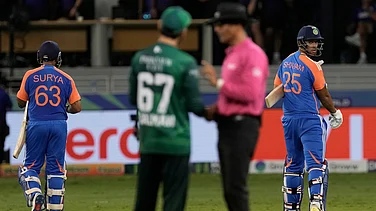After a depressingly dank and hugely frustratingweekend summarily hijacked by two spoilsport hurricanes, it took just one brightand sunny afternoon to herald a new dawn inthe already eventful career of Sachin Tendulkar.
As India’s brand-new bosscomprehensively outmanoeuvred Pakistan’s seasoned campaigners in thelow-scoring third encounter of the Sahara Cup last Wednesday, it was proofenough that the burden of captaincy is sitting light and pretty on the23-year-old. On the field, both in victory and in defeat, the pocket-sizedbatting dynamo is enjoying every moment of the job. And now, with all lingeringdoubts laid at rest, Tendulkar is letting the entire world know that leadingcomes naturally to him.
"Sachin is a supremelyconfident, positive leader," says Indian team manager Sandip Patil."The manner in which he defended two low scores—in the first and thirdSahara Cup matches—was a clear sign of his ability to stay cool and foc- ussedunder pressure." In fact, even the second match—where that wily, battle-scarredveteran of many India-Pakistan humdingers, Salim Malik, outwitted the Indianbowlers and helped Pakistan romp home with only a delivery to spare—didn’tdo any damage to Sachin’s standing. Every single move he conjured up—thebowling changes, the field placings, the frequent pep talks, the general bodylanguage—had the unmistakable stamp of a naturally shrewd cricketing brain.
"The second game couldhave gone either way," says Tendulkar of the classic limited oversfaceoff. "The match was decided on the second-last delivery. It was aquestion of just a little bit of luck." The Indian team batted welldespite the captain himself failing to make a sizeable contribution,piling up 264 for six in 50 overs, and then Tendulkar marshalled hisresources with great spunk and imagination. There was, of course, a hintof criticism after the match. But Tendulkar sprang to the defence of hisdecision to toss the ball to Sunil Joshi for the last over, with Pakistanneeding five runs for victory. "He is a bowler in form, so I turnedto him. He didn’t do a bad job at all."
Nobody knows it better than Sachinhimself: the nucleus of the Indian team ofthe future is slowly but surely emerging. Saurav Ganguly has proved himself.Venkatesh Prasad is chugging along nicely. Joshi is on his way to becoming anallrounder of exceptional worth. And Rahul Dravid at number three has done hiscaptain proud.
As things fall into place, the newstars of Indian cricket have attained a healthy degree of consistency, while thelikes of Anil Kumble and Azharuddin are back in form. The only worry is anopening partner for Tendulkar. But with Navjot Sidhu all set to return to theside in mid-October, even that is a temporary problem. As Tendulkar says:"Sidhu is a seasoned campaigner, it would be great to have him back in thesquad."
That’s Tendulkar: no unduedisappointment in defeat, no ill-tempered monosyllabic jabs at journalists inthe face of a stray voice of dissent, no letting his teammates down. What’smore, absolutely no running away from responsibility. "I did consult the senior players, but the decision was mine," heconfesses with disarming candour.
Pakistan captain Wasim Akram issuffici-ently impressed with the way Tendulkar conducted himself to admit thathe "has the makings of a very aggressive captain". But he is quick toadd that "it is too early to make a reliable assessment". "Givehim at least six more months before you start judging him. He is very new to thejob and has led the team in only a few one-dayers. The Test matches in theseason ahead will be his greatest challenge yet," pronounces the man whohas been credited with wielding the exceedingly and variously talentedcricketers who constitute the generally temperamental Pakistani team into afight-ing fit unit that recently outplayed England in every department of thegame.
Tendulkar’s popularity inToronto has to be seen to be believed. And it’s not just South Asianimmigrants who are full of him. Even Canadians in this sprawling cityof nearly40 active cricket clubs have singled him out for special attention. There is aninfinite interest in what kind of man he is, how much he earns, how he rates asa batsman in comparison with Brian Lara—cricket lovers in Toronto seem keen tolap up every little detail about him.
AN aged Canadian woman, alatecomer to the clubhouse on the third day of the Sahara Cup, was clearlydisappointed to learn that the little master was already back in the pavilionwithout bothering the scorers much. "Where’s your captain, that littleman? He’s great. We love him," she said and walked away to join herhusband for a seat in the balmy morning sun. She didn’t seem like someone youcould discuss the nuances of the LBW rule with, but she obviously knew the righthorse.
Amid all the euphoria that hegenerates wherever he goes, Tendulkar is, of course, a man who is completelyfocussed on the taskat hand. How does he himself see his role as captain?"In order to be effective on the field, the team has to work as a combinedforce. That is what I am striving for," he says. "I’ve told all themembers of the team, especially the younger ones, that they are free to disturbme at any odd hour if they have any problem to discuss, cricketing orpersonal." But is it working? "Yes, I think so," assertsTendulkar. "The team is playing as a cohesive unit. Every player is gettingall the support he deserves from the rest of the team. Saurav, for instance, ishappy with Dravid’s success at the No 3 slot. Similarly, Vikram Rathore wantsNayan Mongia to do well as an opener. There is not the slightest trace ofjealousy among the players."
At 23, Tendulkar is alreadythe elder statesman of Indian cricket. On how well his teammates respond to hisopen, aggressive, positive ways on the field, and off it, will hinge India’sfortunes during the sterner cricketing tests ahead.


























